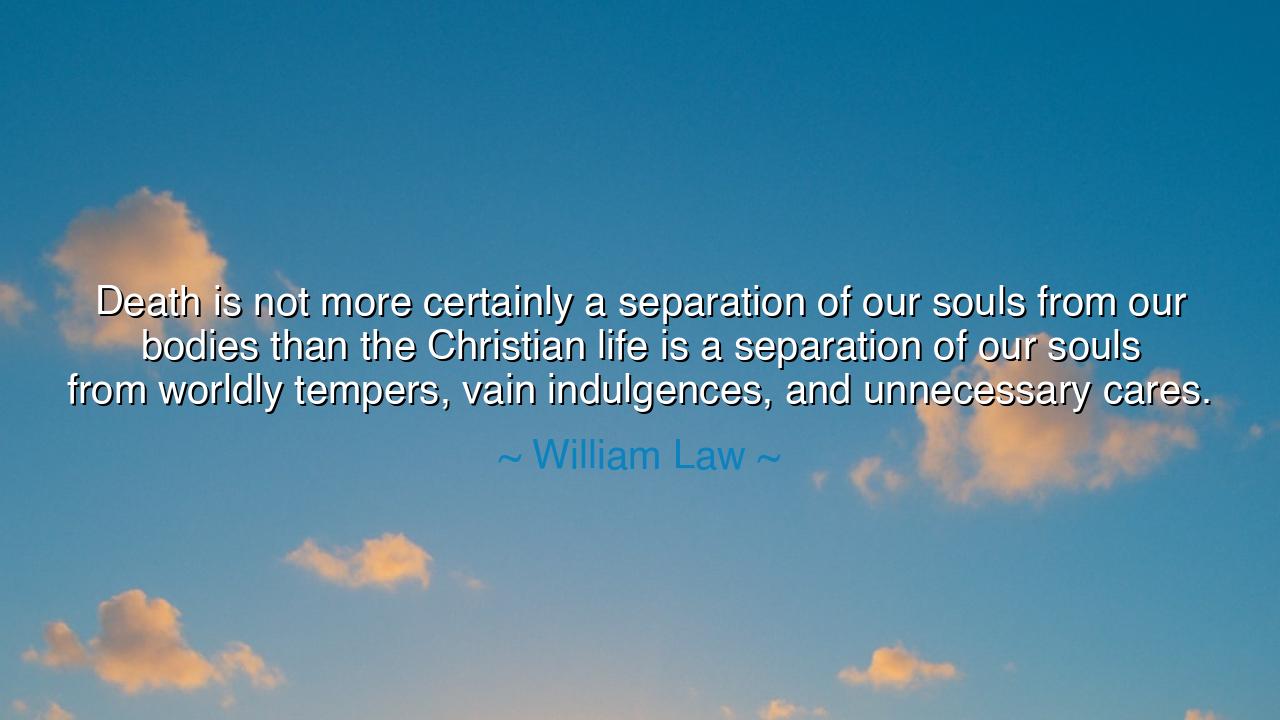
Death is not more certainly a separation of our souls from our
Death is not more certainly a separation of our souls from our bodies than the Christian life is a separation of our souls from worldly tempers, vain indulgences, and unnecessary cares.






The words of William Law, “Death is not more certainly a separation of our souls from our bodies than the Christian life is a separation of our souls from worldly tempers, vain indulgences, and unnecessary cares,” carry the quiet thunder of eternal truth. In this single sentence, Law, one of the great English mystics of the eighteenth century, draws a sacred comparison between physical death and spiritual rebirth. He reminds us that true faith is not merely belief, but a transformation — a deliberate parting from the illusions and appetites of the world. Just as death severs the soul from the body, the Christian life severs the soul from the bondage of pride, vanity, and endless striving after things that perish.
To the ancients, this idea was not strange. The philosophers of Greece and the desert fathers of early Christianity alike taught that the path to wisdom begins with detachment. The Stoics called it apatheia, freedom from the tyranny of passion. The Christian mystics called it death to self — the act of dying inwardly to all that is false, all that distracts the soul from divine communion. Law’s words thus echo the timeless spiritual law that life in God begins only when one has learned to die to the world. It is not a rejection of creation, but a liberation from slavery to it. He teaches that to live well is not to escape the world, but to walk within it unshackled by its temptations and fears.
William Law himself lived what he taught. A priest who refused to take an oath of allegiance to a worldly monarch, he lost his position and spent his years in quiet devotion and writing. His masterpiece, A Serious Call to a Devout and Holy Life, became a beacon of spiritual renewal in an age of luxury and complacency. Law observed how easily men surrendered their souls to vain indulgences — to comfort, fashion, and ambition — mistaking such pursuits for fulfillment. Yet he saw clearly that these things only deepen the soul’s restlessness. Thus he wrote, with compassion and conviction, that the Christian must die before dying — that the death of the ego is the first breath of true life.
History is filled with those who learned this truth not by sermon, but by suffering. Consider Saint Francis of Assisi, who was once the son of a wealthy merchant, clothed in silk and glory. One day, hearing the call of Heaven, he cast off his garments in the public square and chose the poverty of Christ. His friends mocked him, his father disowned him, but Francis smiled, for he had discovered a joy that gold could not buy. He had undergone the very separation that William Law describes — a death to worldly tempers and vain indulgences — and in that death, he found a new and radiant life. His was not a loss, but a resurrection of the soul.
This teaching, however, is not meant only for monks and saints. Law speaks to every soul weighed down by the unnecessary cares of the age — the anxious pursuit of wealth, status, and praise. Each of these is a chain, subtle yet heavy. When the heart clings to what must fade, it becomes enslaved to fear and disappointment. But when one learns to release these burdens — to live simply, love purely, and trust deeply — one’s life begins to mirror eternity. This, Law says, is the Christian life: not an escape from the world, but a sanctification of it through inner freedom.
“Death is not more certainly a separation…” The phrase itself is deliberate and solemn. Law likens spiritual rebirth to physical death because both are irreversible. When the soul has once turned wholly toward God, the old ways lose their hold forever. The world still exists, but it no longer commands allegiance. The pleasures that once enslaved now pass by like shadows, and the fears that once haunted lose their power. The soul, having died to the lesser, lives for the greater. It is the mystery Christ spoke of when He said, “He who loses his life shall find it.”
So, my listener, learn from this teaching: if you wish to live truly, you must learn to die before you die. Die to envy, to vanity, to restless striving. Die to the noise of the world that drowns the whisper of truth. And in doing so, you will awaken to the stillness where peace abides. Do not mistake this dying for sorrow; it is the prelude to life. For as William Law teaches, the soul that separates from worldly care is not entering darkness — it is stepping into light.
Thus, let this be your practice: each day, loosen one attachment, forgive one slight, let go of one needless worry. Let your soul grow light enough to ascend. For the Christian life — and indeed, all holy life — is a daily resurrection, a turning from the transient toward the eternal. And when at last the true death comes, it will not find you afraid, for you will already have crossed the threshold in spirit — from worldliness into wonder, from bondage into freedom, from death into life everlasting.






AAdministratorAdministrator
Welcome, honored guests. Please leave a comment, we will respond soon